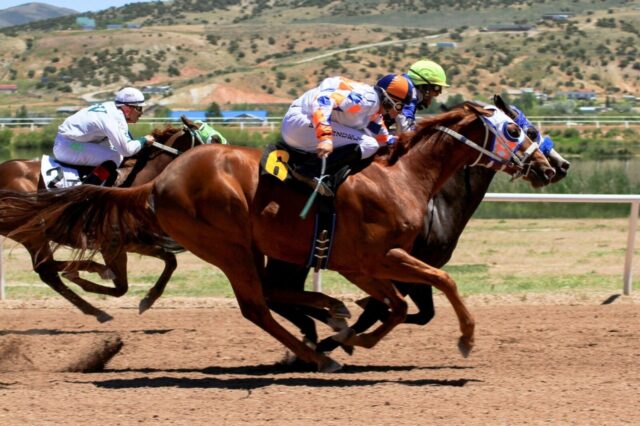
When placing a horse race bet, it would help to strategically reduce your risk of losing. While many may believe that luck is the only way to achieve this, one may use several strategies to lessen the likelihood of failure.
Taking precautions to reduce the risk is vital because losing at horse races can be expensive and upsetting. Here are some pointers to aid you in carrying out that task.

Research The Horse
Get familiar with their performance history, study jockey records, and form guides from the Racing Post website or other race databases. Knowing a horse’s past can indicate their ability and how likely they are to win or place in any given race. Look for jockeys with a better track record of winning and have already demonstrated their reliability.
Watching some of the races in which the horses you intend to bet on compete might also be beneficial. This will offer you a sense of their strength, speed, and endurance, which may help you decide.
Additionally, analyze the race conditions such as distance, track surface, and weather, as they can greatly influence a horse’s performance. Consider the horse’s recent form and consistency, paying attention to factors like recent wins, placements, and improvements. Don’t overlook the significance of trainers, as their expertise can contribute to a horse’s success. Lastly, manage your bankroll wisely and bet responsibly to maximize your chances of success.
Choose Your Bets Wisely
It can be tempting to bet on every race, but this isn’t necessarily the best approach. Instead, it’s wise to take your time and choose your bets carefully by analyzing more than just a horse’s past performance. If you want to start betting, you can bet with TVG for various wagering options.
Look at the whole picture, the jockey’s form, track conditions, market movements, and other factors. Taking a more considered approach can reduce the risk of losing and increase your chances of success in the long run.

Analyze The Suitability Of The Track
Make sure that you study the course and understand how it suits each horse running. Some horses perform better on flat surfaces, while others may be more suited to galloping or undulating tracks.
Remember to also factor in weather conditions, as this can influence a horse’s performance. If the track is wetter than usual, some horses may struggle more than others, so be sure to consider this.
Furthermore, evaluate the track conditions, such as firmness or softness, as it can significantly impact a horse’s running style and speed. Take note of any specific track biases or patterns that may favor certain types of horses. Adapting your strategy based on the track’s suitability and conditions can enhance your chances of making informed betting decisions.
Study The Odds
If the odds are too good to be true, then there’s likely a reason why. This doesn’t necessarily mean it will be a bad bet – more research may need to be done before committing funds.
It would help if you also compared the odds across different betting sites to understand how the market is moving. A large discrepancy between bookmakers could indicate that something has changed with the horse’s prospects, and you may need to adjust your strategy accordingly.
Additionally, consider the implied probability behind the odds. Calculate the implied probability of each horse winning based on the odds offered by the bookmakers. Compare these probabilities with your own assessment of the horse’s chances to identify any value bets. Remember, finding value is key to long-term success in betting. Stay vigilant and adapt your approach as the odds fluctuate.

Bet Strategically
Using good judgment when betting can also help to cut losses. Instead of putting all your eggs in one basket by selecting a single horse, consider placing wagers on many horses in the same race. By doing this, you may still receive some returns from other horses even if the selected horse does not win.
Additionally, you might want to think about hedging your bets. This is placing wagers on the same event both for and against, guaranteeing you a profit regardless of which horse triumphs.
Manage Your Bankroll Effectively
It’s not enough to choose the best horse when you’re betting; you also need to manage your bankroll effectively. This entails limiting how much you are willing to risk every race and only placing bets with money you can afford to lose.
So, to clearly identify where your money is going, keeping track of your wins and losses is crucial. You’ll be able to make wiser choices in the future and lower your chance of suffering unnecessary losses as a result.

Avoid Impulsive Betting
Gambling on the spur of the moment can result in losses that could have been prevented. It’s simple to get carried away during a race, but keeping your composure and adhering to your pre-planned course of action is crucial.
Although it may be tempting to place a wager on a horse simply because you like its name or color, it pays to be patient and take your time to make a wise choice. Doing this can lower your risk of suffering losses and raise your chances of making money in the long run.
Don’t Chase Losses
If you’ve made a mistake, it’s crucial to avoid making it worse by placing more bets to make up for your losses quickly. This frequently results in even higher losses and seriously hurts your bankroll.
Instead, step back and evaluate the circumstance. Verify that your plan is still in place and search for any possible errors that may have occurred. Losses will be kept to a minimum, thanks to this.

Final Thoughts
Betting on horse races is risky, but following these eight tips can help minimize the risk of losses. This will ensure that you have more money in your pocket when the race card ends. So, take some time to plan your strategy and ensure you are betting responsibly.









